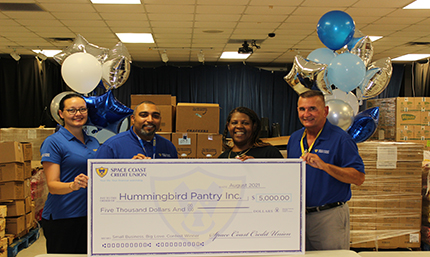News & Tips
Alternative Ways to Save for Retirement Beyond 401(k)s

A 401(k) typically offers tax advantages and employer-matched contributions. But perhaps your employer doesn’t offer a 401(k) or you’re self-employed. Or, maybe you’d like to diversify your retirement savings portfolio—a wise choice!
Keep in mind that you may need more than Social Security benefits in your golden years to cover all necessary and unexpected expenses comfortably. So, if you can, start stashing cash as early as possible to give your funds time to grow for your nest egg.
Let’s look at some of the best alternative ways to save for retirement that go beyond 401(k)s.
Alternative Ways to Save for Retirement
Be sure to save at least 3-6 months’ worth of expenses for emergencies—preferably in a savings account that allows you to access your funds at any time without penalties or fees for making withdrawals.
A helpful mindset is to think of your emergency savings account as a financial first aid kit and a retirement account like a cookie jar. The two accounts have very specific purposes!
You have many options when it comes to ways to save for retirement. Just remember that you don’t necessarily have to put all your eggs in one basket. While this list is by no means exhaustive, here are 10 alternative ways to save for retirement beyond 401(k)s:
1. Traditional IRA (Individual Retirement Account)
This type of IRA allows you to make pre-tax contributions that can grow over time, and you can possibly deduct contributions from your taxable income (but you’re subject to income taxes upon withdrawal). As of 2023, the maximum annual contribution is $6,500 for those under age 50 and $7,500 for age 50 and older.
2. Roth IRA
With a Roth IRA, you’d make after-tax contributions. The benefit of this account is that your contributions can grow tax-free, and you don’t have to pay taxes on your withdrawals upon retirement. Plus, you can withdraw your contributions penalty-free before you’re 59 ½ years old (but you’d have to pay a 10% penalty on earnings before that age). The maximum annual contribution is the same as for traditional IRAs.
3. Health Savings Accounts (HSAs)
Not only can an HSA help you pay for health care if you have a high-deductible health plan, but it can also allow you to earn interest on the account free of federal taxes. You can get a federal tax deduction for contributing to the HSA, employers can also contribute, and you can roll over an IRA into an HSA if necessary. You can also make withdrawals at age 65 without the 20% penalty for non-medical uses (but that amount it subject to taxes).
4. SEP IRAs, SIMPLE IRAs, and Solo 401(k)s
If you’re self-employed, then a Simplified Employee Pension (SEP) IRA, a SIMPLE (Savings Incentive Match Plan for Employees) IRA, or a Solo 401(k) may be a good option for you. All three operate similarly to a traditional IRA, where your contributions grow tax-deferred until retirement. They tend to offer more flexibility and higher contribution limits than traditional or Roth IRAs, but the requirements and limit amounts vary based on if you have employees or not. Learn more about these retirement plans here.
5. CDs (Certificates of Deposit) & IRA CDs
With both CDs and IRA CDs, you’d need to deposit a minimum amount, which earns interest during the term you’ve chosen. With an IRA CD, the deposit must come from an IRA. You could even ladder CDs as part of your investment strategy.
At Space Coast Credit Union (SCCU), you can open CDs and IRA CDs for as little as $5006, and they’re lower-risk investments because they’re federally insured by the NCUA and ensure a guaranteed rate of return and maximum security. Not to mention we offer CD and IRA CD terms from 3 to 60 months!
6. Annuities
Annuities are insurance contracts that financial institutions issue and distribute. They’re a way that you can receive a steady income stream, and they often help minimize the risk of outliving your assets when you’re retired. Best of all, they can earn interest!
In the accumulation phase, you’d fund the annuity with a lump sum or periodic payments. Depending on the product’s payout period, or “annuitization phase,” you’d receive variable or fixed payment amounts either immediately or at a later age (deferred).
Be aware that annuities often have a “surrender period,” a period of time where you can’t make withdrawals unless you pay a charge or fee (similar to CDs).
7. High-Yield Savings Accounts
If you’re looking for a low-risk way to save money that can grow thanks to competitively high interest rates, then high-yield savings accounts check the boxes. Make sure that it’s FDIC- or NCUA-insured up to $250,000 per depositor. Plus, with this type of savings account, you often will have easy access to your funds if you need them.
8. Money Market Savings Accounts
These types of savings accounts often have higher minimum balance requirements than high-yield savings accounts. As they’re often FDIC- or NCUA-insured too, they’re a safe way to grow your savings at a good rate while having easy access to your funds. Learn more about money market savings accounts.
9. Investment Accounts
Aside from IRAs, you could look into a standard brokerage account (also known as a taxable brokerage account), where you have options to invest in stocks, mutual funds, bonds, exchange-traded funds, and more.
You’ll need to keep in mind that it’s very likely you’ll need to pay taxes on any interest or dividends you’ve earned or gains on investments you’ve sold that year. You could choose to open an individual or joint taxable brokerage account. The risks will vary depending on the type of accounts and investments.
10. Real Estate
Investing in real estate, such as buying a rental home or flipping a unit, often requires a large amount of capital up front, but it may help bring in income to pad your savings.
You don’t necessarily have to go the direct route. You could also look at more hands-off strategies that may offer capital gains. For example, investing in a real estate investment trust (REIT), a real estate investment group (REIG), or in an online real estate platform (real estate crowdfunding).
The risks and returns on real estate will vary.
Note, with any of these alternatives, consult a tax advisor for further information regarding the deductibility of interest and charges.
What is a better option than a 401(k)?
The best alternative to a 401(k) often depends on how you earn income, how comfortable you are with investment risks, and how many years you have until retirement. As IRAs and HSAs have many beneficial qualities specific for retirement and also offer many tax advantages, they’re often the top alternatives to 401(k)s. Learn more about the differences between 401(k)s and IRAs here.
While savings accounts and CDs offer low-risk ways to save for retirement, your money will not likely grow at the rate of IRAs. It’s a good idea to meet with a financial advisor to evaluate your income streams and retirement goals. A good approach: maintaining a well-balanced, diversified portfolio that ultimately helps you mitigate risk and allows your contributions to grow at reasonable rates.
Saving for Retirement Calculators
Would you like to estimate how long your retirement savings will last, how much you’ll need for retirement, or how much monthly income you’ll have in your golden years? Our online retirement calculators can help you with that! You’ll also find calculators to help you estimate your Social Security benefits amount, determine whether to spend or invest extra money in an IRA, and so much more. See all of our financial calculators.
SCCU Offers a Wide Range of Savings Options
Needless to say—we offer a variety of accounts that make for great savings vehicles for retirement! We offer IRA options and HSAs. Check out all of our savings account options too—including our round-up savings program (SCCU Saving Cents) and Christmas Club Savings.
As the third-largest credit union in Florida, we offer competitive interest rates, and our brand promise is Honest People. Trusted Products. Time Valued. We serve members in 34 counties both online and at more than 60+ branches in Florida. As long as you live or work in any of our service counties, you can become a member at SCCU with a $5 Share Savings deposit.


































































































.jpg?width=430&height=257&ext=.jpg)




























